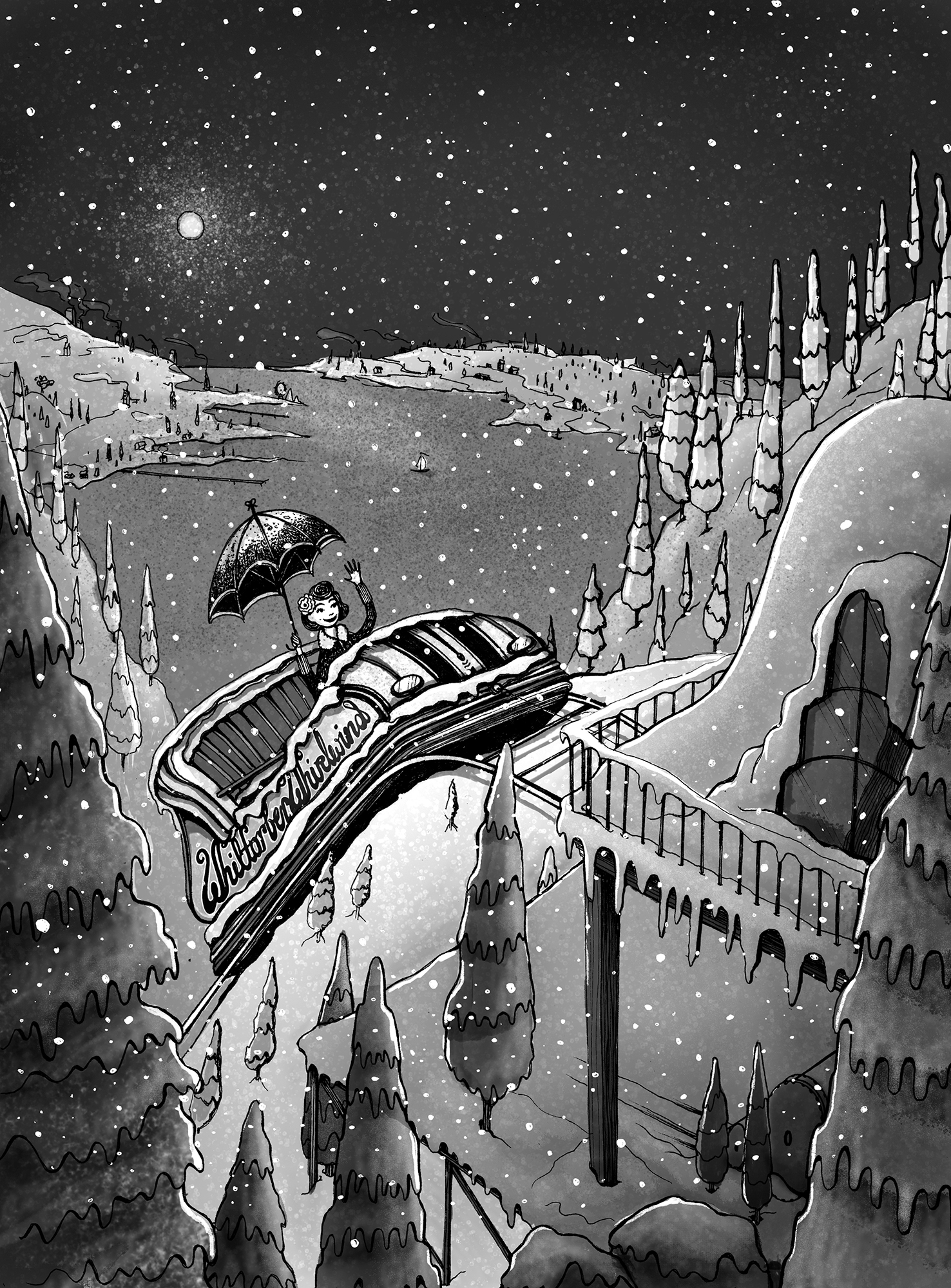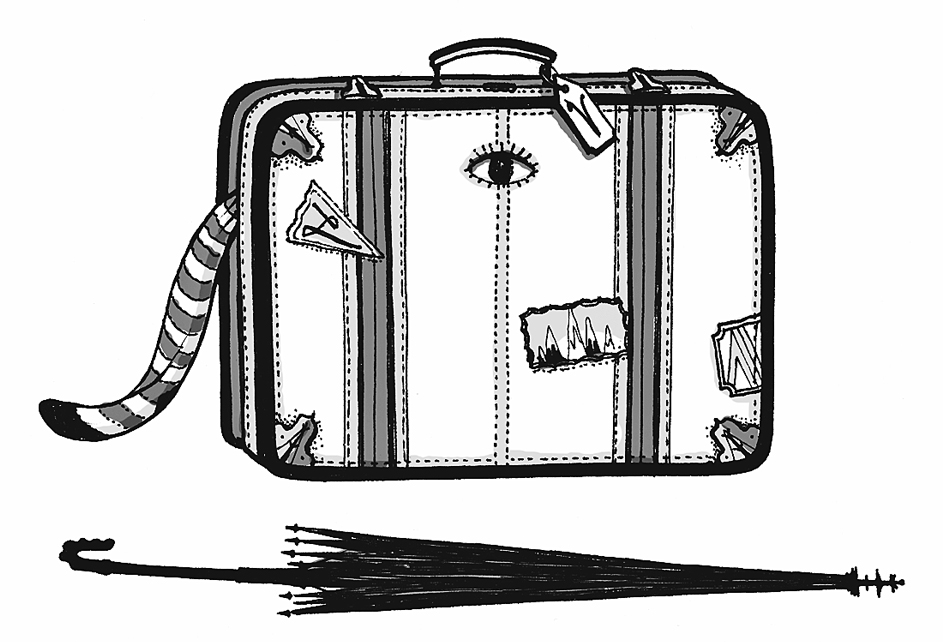Greenglass House
Authors: Kate Milford


The Tale of the Otter and the Eye
Sample Chapter from THE BONESHAKER
Clarion Books
215 Park Avenue South
New York, New York 10003
Â
Copyright © 2014 by Kate Milford
Illustrations copyright © 2014 by Jaime Zollars
Â
All rights reserved. For information about permission to reproduce selections from this book, write to Permissions, Houghton Mifflin Harcourt Publishing Company, 215 Park Avenue South, New York, New York 10003.
Â
Clarion Books is an imprint of Houghton Mifflin Harcourt Publishing Company.
Â
Â
The Library of Congress has cataloged the print edition as follows:
Milford, Kate.
Greenglass House / by Kate Milford ; with illustrations by Jaime Zollars.
pages cm
Summary: At Greenglass House, a smuggler's inn, twelve-year-old Milo, the innkeeper's adopted son, plans to spend his winter holidays relaxing but soon guests are arriving with strange stories about the house sending Milo and Meddy, the cook's daughter, on an adventure.
ISBN 978-0-544-05270-3 (hardback) â ISBN 978-0-544-05555-1 (ebook)
[1. Mystery and detective stories. 2. HotelsâFiction. 3. MagicâFiction. 4. AdoptionâFiction.]Â Â I. Title.
PZ7.M594845Gre 2014
[Fic]âdc23
2013036212
Â
eISBN 978-0-544-05555-1
v1.0914
Â
Â
Â
Â
To my family, near and far, with thanks
for all my childhood Christmases;
Â
To Raegan, Hadley, Phero, Oliver, Griffin,
and the one we call Amelia, adventurers all;
Â
To Emma, who twisted my arm and
made me fix the things that didn't work;
Â
And to Grandmoo, because it's her favorite.


Â
one
There is a right way to do things and a wrong way, if you're going to run a hotel in a smugglers' town.
You shouldn't make it a habit to ask too many questions, for one thing. And you probably shouldn't be in it for the money. Smugglers are always going to be flush with cash as soon as they find a buyer for the eight cartons of fountain pen cartridges that write in illegal shades of green, but they never have money today. You should, if you are going to run a smugglers' hotel, get a big account book and assume that whatever you write in it, the reality is, you're going to get paid in fountain pen cartridges. If you're lucky. You could just as easily get paid with something even more useless.
Milo Pine did not run a smugglers' hotel, but his parents did. It was an inn, actually; a huge, ramshackle manor house that looked as if it had been cobbled together from discarded pieces of a dozen mismatched mansions collected from a dozen different cities. It was called Greenglass House, and it sat on the side of a hill overlooking an inlet of harbors, a little district built half on the shore and half on the piers that jutted out into the river Skidwrack like the teeth of a comb. It was a long climb up to the inn from the waterfront by foot, or an only slightly shorter trip by the cable railway that led from the inn's private dock up the steep slope of Whilforber Hill. And of course the inn wasn't only for smugglers, but that was who turned up most often, so that was how Milo thought of it.
Milo had lived at Greenglass House ever since he'd been adopted by Nora and Ben Pine when he was a baby. It had always been home. And he was used to the bizarre folks who passed through the inn, some of them coming back every season like extended family who showed up to pinch your cheeks at holidays and then disappeared again. After twelve years, he was even getting pretty good at predicting who was going to show up when. Smugglers were like bugs or vegetables. They had their seasons. Which was why it was so weird when the huge old bell on the porch, the one that was connected to the winch that drove the cable that in turn hauled the car up its tracks, started ringing.
The old iron bell's tone changed with the seasons too, and with the time of day. This evening, the first of winter vacation, was cold and brittle, and the snow had just begun to fall. Today, therefore, the bell itself had a brittle tone. It had a sound like a gulp of frigid air.
Milo looked up from the coffee table, where he was working on a math problem. He liked to get his homework out of the way right off the bat so he could enjoy the holidays without thinking about school. He glanced at his mother, who was sprawled across the rag rug in front of the big stone fireplace, reading. “Someone's coming up?” he asked incredulously.
Mrs. Pine got to her feet, tucked her book under her arm, padded across to the foyer, and peered out the window by the door. “Someone wants to. We'd better go start the winch.”
“But we never have guests the first week of vacation,” Milo protested. He felt a vague unease start to rise in his stomach and tried to swallow it down. Vacation couldn't possibly get spoiled so quickly, could it? He'd only stepped off the launch that ferried the Quayside kids to and from school a few hours ago.
“Well, not often, we don't,” Mrs. Pine said as she laced up her boots, “but that's not because we have a rule about it. It's just because that's the way it usually turns out.”
“But it's
vacation!
”
His mother shrugged and held out his coat. “Come on, kiddo. Be a gentleman. Don't send your mom out into the cold alone.”
Ah, the all-powerful
gentleman
card. Still grumbling, Milo got to his feet, quietly whispering
“vacation vacation vacation”
as he slouched across to join her. He had just about finished his homework. That was supposed to be the end of responsibility for a while.
The bell rang again. Milo gave in to his frustration, stopped in the middle of the foyer with one boot on, and gave a single, furious yell with his hands clenched at his sides.
Mrs. Pine waited with folded arms until he was finished. “Got that out of your system?” she asked gently. Milo scowled. “I know this isn't the usual routine,” his mother added, “and I know you don't like it when things don't happen the way you expect.” She bent to hunt in the catchall basket beside the door for a flashlight. “But look, being surprised isn't always a bad thing.”
The fact that it sounded logical didn't change the way Milo felt, of course. But he nodded and finished getting dressed for the cold. He followed his mother out onto the porch and across the lawn to a break in the dark wall of bare white birches and blue-green firs that covered the hillside. There, in a pool of deeper shadow, the grass gave way to a stone landing.
All his life, ever since he was really small, Milo had been very bothered by sudden changes of plan. More than bothered. Being surprised made him uneasy at the best of times. Now, tromping across the fresh snow in the bitter cold to haul a stranger up the hill, an unexpected stranger who was going to require him to work when all he really wanted was a quiet week or so with his parents and his house to himself . . . well, that made the uneasiness feel uncomfortably like panic.
The flashlight's beam pierced the pool of shadow, which flickered and melted into butter-gold; Mrs. Pine had turned on the light in the little pavilion hidden in the trees where the cable railway landed.
The railway began a hundred yards below, at the river. There were other ways to get to the bottom of the gorge, or to get to the top if you were down. There was a steep and winding stair that ran more or less parallel to the railway and led to the same pavilion. There was also a road that snaked away from the inn and around the side of the hill down into the city proper, which was about a twenty-minute drive away. But only Milo, his parents, and the inn's chef, Mrs. Caraway, ever really used the road. Guests didn't come from the direction of the city. Guests came by river, sometimes in their own boats and sometimes by paying one of the dozens of old tars in the Quayside Harbors who'd ferry a person to Greenglass House in their equally aged boats for a few bucks. Given the option of being hauled up the steep hill in an antique conveyance that looked like a demented and oversized bumper car on rails or climbing three hundred and ten steps (Milo had counted), they always chose the former.
Inside the stone-floored pavilion were a bench, a shed, and the steel tracks of the railway. Mrs. Pine unlocked the shed, and Milo followed her inside to where the heavy cable that ran between the tracks looped around the giant spindle of the winch. Thanks to a complex mess of gears, once you got the winch going, it did all the work necessary to haul the single car up the slope. But it was old, and the lever tended to stick. Getting it moving was easier with two pairs of hands.
Together, Milo and his mother grasped the lever. “One, two, three!” Milo counted, and as one they hauled it forward. The cold metal of the gears whined like an old dog, and then they started to turn.
As Milo and Mrs. Pine waited for the railcar to click and clank its way to the top of the slope, he wondered what kind of person it was bringing up. Smugglers came in all kinds, and of course sometimes the inn had guests who were sailors or travelers and not smugglers at all. But not very oftenâand almost never in winter, when the Skidwrack and its hidden inlets were so often frozen.
While Milo was thinking, winding strings of glittering white firefly-sized lights came to life, outlining the pavilion and trailing off down the hill along the railing of the stairs. His mother straightened up from where she had just plugged them in.
“So what do you think? An elf on the lam from the North Pole? A popgun runner? Eggnog bootlegger?” she asked. “Best guess wins a brownie sundae. Loser makes it.”
“What are those flower bulbs Grandma always sends you at Christmas that you love?”
“Paperwhites?”
“Yeah. It's a guy with a cargo of those. And stockings. Green ones with pink stripes.” A low whine joined the creaking of the cable around the big spindle in the shed. You could tell where the railcar was by how the sounds it made changed. Milo pictured the misshapen old iron lamppost the car would be passing right about now.
“Green and pink stockings?”
